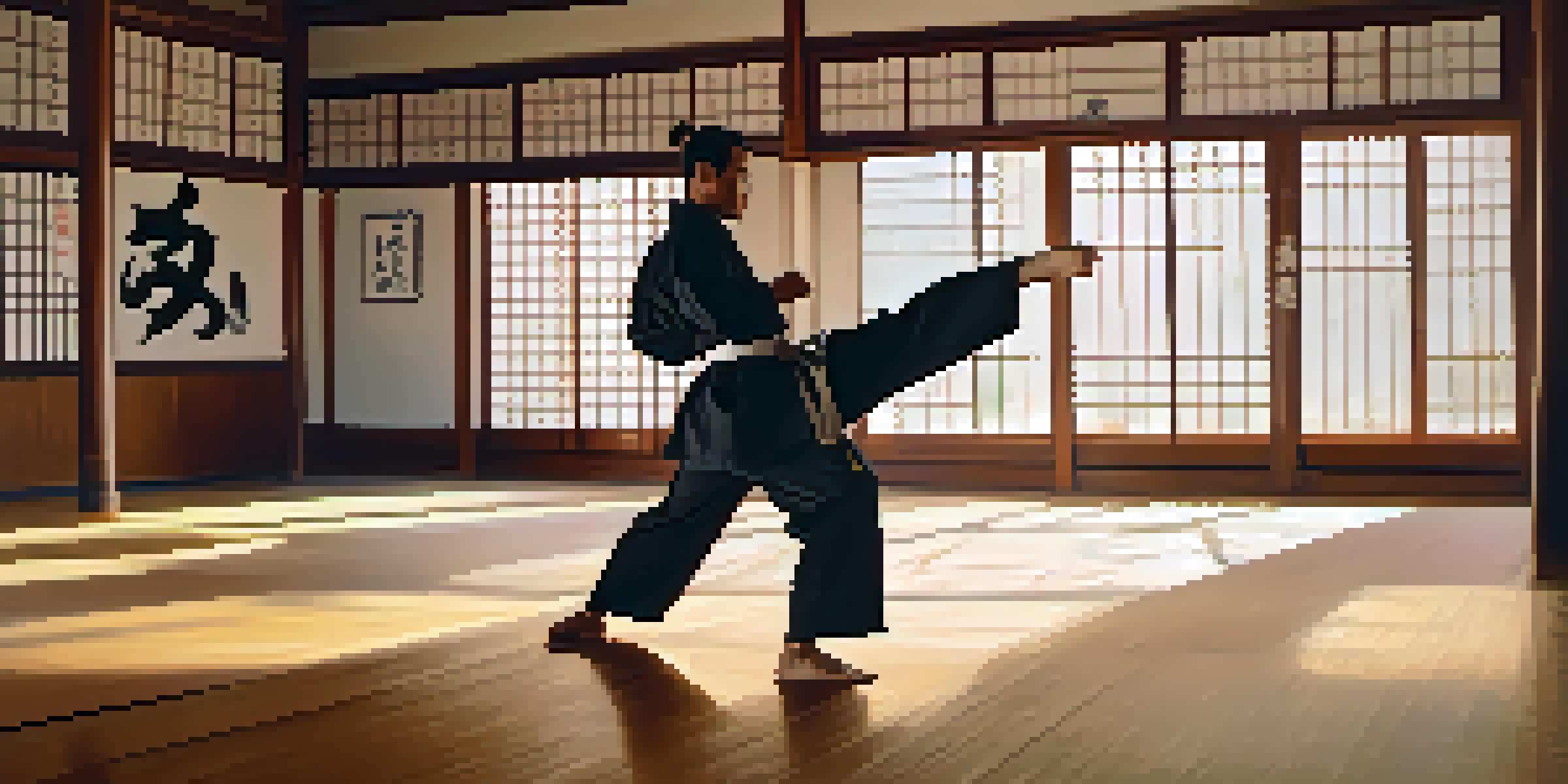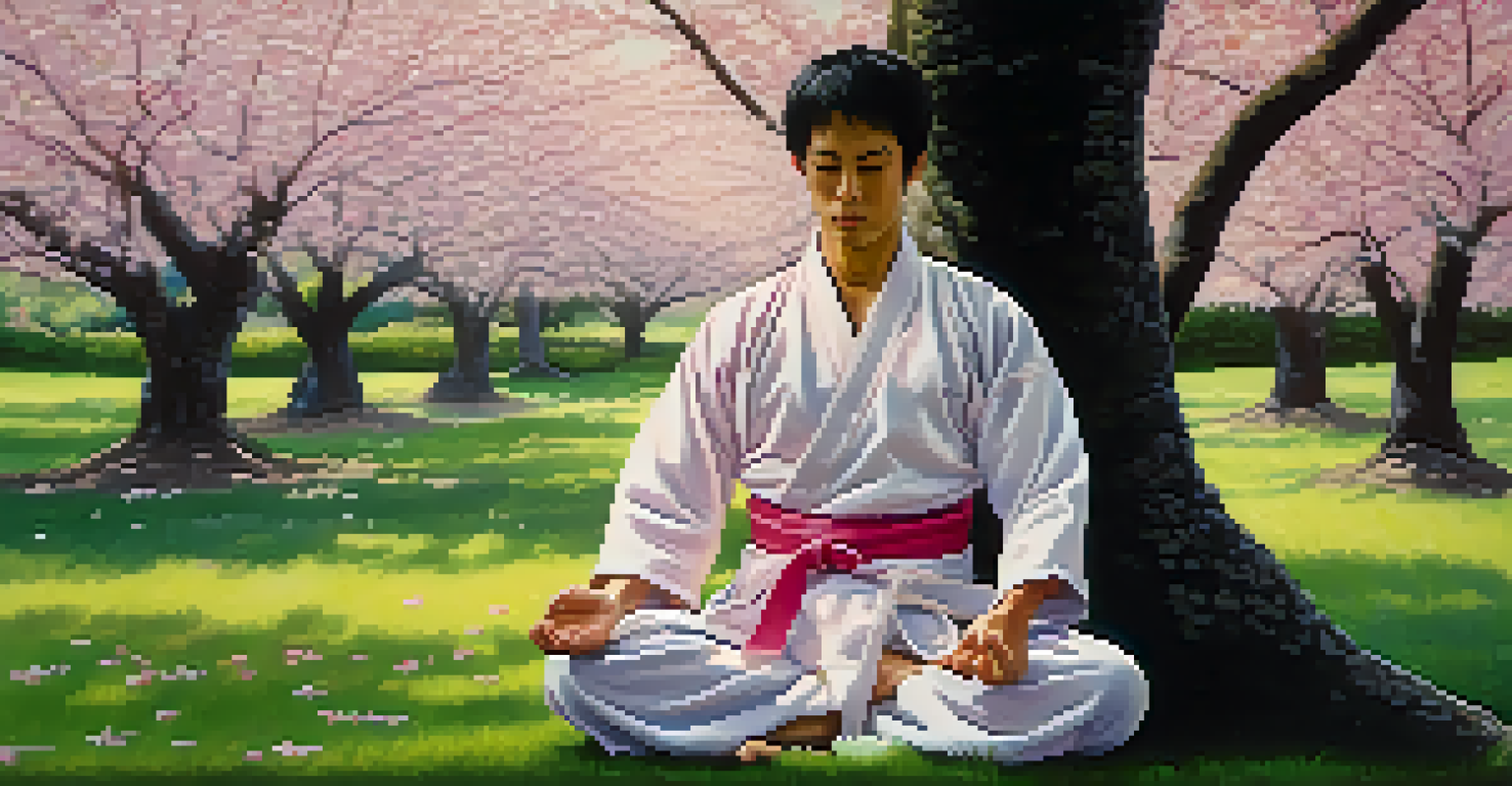Time Management Lessons from Martial Arts for Working Adults

Understanding the Importance of Focus in Martial Arts
In martial arts, focus is crucial. Practitioners learn to eliminate distractions, honing in on their movements and techniques. This intense concentration not only improves skill but also reinforces the importance of being present during training sessions.
Discipline is the bridge between goals and accomplishment.
Similarly, working adults can benefit immensely from focusing on one task at a time. Multitasking often leads to decreased productivity and increased stress. By adopting a focused approach, you can enhance your efficiency and achieve better results in your work.
Just like a martial artist centers their mind before a sparring match, you can set aside specific times to concentrate on critical tasks. This practice helps create a sense of clarity and purpose in your daily routine.
Embracing Discipline Through Martial Arts Training
Discipline is at the heart of martial arts. Consistent training schedules are vital, teaching practitioners to show up, work hard, and improve over time. This discipline becomes a cornerstone of their success, both on and off the mat.

For working adults, cultivating discipline can be transformative. Establishing a structured daily routine allows you to allocate time effectively, ensuring that crucial tasks are completed without procrastination. It's about creating accountability, both to yourself and your goals.
Focus Boosts Performance
Martial artists enhance their skills through intense focus, a practice that can also improve productivity for working adults.
By adopting a disciplined approach reminiscent of martial artists, you can tackle tasks systematically, reducing overwhelm and fostering a sense of accomplishment as you check off your to-do list.
Setting Clear Goals Like a Martial Artist
Martial artists often set specific goals, whether it’s achieving a new belt rank or mastering a technique. These goals provide motivation and direction, making the path to improvement clear. Each milestone becomes a stepping stone towards greater proficiency.
Success is not final, failure is not fatal: It is the courage to continue that counts.
In the professional realm, setting clear, achievable goals is equally important. When you define what you want to accomplish, it becomes easier to devise a plan and prioritize your tasks. This clarity helps you stay on track and measure your progress effectively.
Think of your goals as a martial arts belt system. Each task you complete is like advancing to the next belt, providing motivation and a sense of achievement along your journey.
Learning the Art of Adaptability in Martial Arts
Martial arts emphasize adaptability; practitioners often face opponents with varying styles and techniques. Learning to adapt quickly is essential for success in a sparring match, as it allows them to respond effectively to unexpected challenges.
This lesson translates well to the workplace, where flexibility is key to managing time effectively. Unexpected tasks or changes can disrupt our plans, but being adaptable enables us to pivot and prioritize what truly matters.
Discipline Drives Success
The structured training in martial arts fosters discipline, which can empower professionals to manage their time and tasks more effectively.
By embracing adaptability, you can respond to unforeseen challenges without losing sight of your goals. Just as a martial artist adjusts their strategy mid-fight, you can shift your focus and resources to tackle urgent tasks efficiently.
The Power of Reflection After Practice or Training
After each martial arts session, practitioners often reflect on their performance. This practice of self-assessment helps them identify areas for improvement and celebrate their achievements, fostering a growth mindset.
In a professional context, taking time to reflect on your daily tasks can be incredibly beneficial. By evaluating what worked well and what didn’t, you can refine your approach and make better decisions moving forward.
Consider setting aside a few minutes at the end of each day to reflect. Just as martial artists learn from each training session, you can gain valuable insights that enhance your time management skills.
Building Resilience Like a Martial Artist
Martial arts teach resilience; practitioners face challenges head-on, learning to overcome failures and setbacks. This perseverance is crucial for growth and success, as it builds character and determination.
For working adults, resilience is equally important in managing time effectively. When faced with setbacks, whether it's a missed deadline or an overwhelming project, the ability to bounce back helps maintain momentum and productivity.
Balance is Key to Well-being
Martial arts teach the importance of balance, a philosophy that can help busy professionals achieve a healthier work-life dynamic.
By cultivating resilience, you can approach challenges with a positive mindset. Just as martial artists rise after a fall, you can tackle obstacles with renewed determination, ensuring that you stay on track with your time management.
The Importance of Routine in Martial Arts Practice
Routine is a fundamental aspect of martial arts training. Regular practice not only reinforces skills but also builds muscle memory, enabling practitioners to perform techniques instinctively during a match.
In your professional life, establishing a routine can significantly enhance your time management. A consistent schedule allows you to allocate specific times for tasks, reducing decision fatigue and promoting efficiency.

Think of your daily routine as your training regimen. Just as martial artists follow a set practice schedule, you can create a structured day that maximizes productivity and helps you achieve your goals.
Finding Balance: The Martial Arts Philosophy
Martial arts embody the philosophy of balance, not just in physical movements but also in life. Practitioners learn to balance training with recovery, work with rest, and ambition with humility.
For busy professionals, achieving a work-life balance is crucial for effective time management. Overworking can lead to burnout, while neglecting personal time can diminish overall well-being. Striking a balance ensures productivity without sacrificing your health.
Adopting this philosophy of balance can transform your approach to time management. Just as martial artists strive for equilibrium in their training, you can create a harmonious relationship between work and personal life, leading to sustainable success.